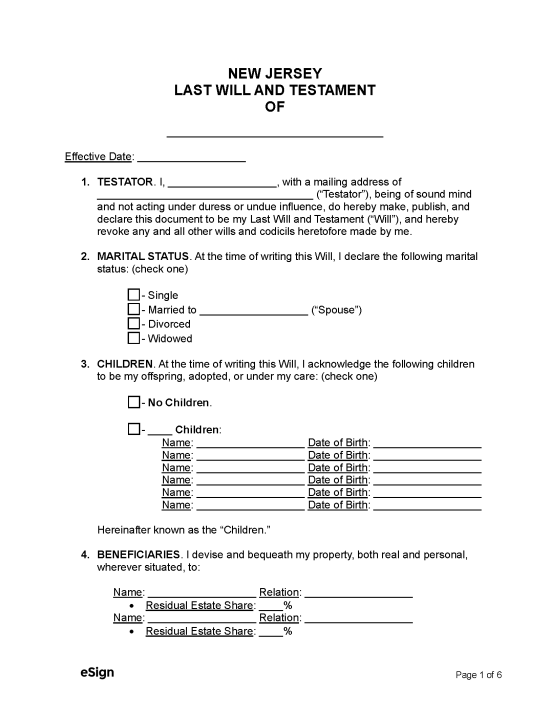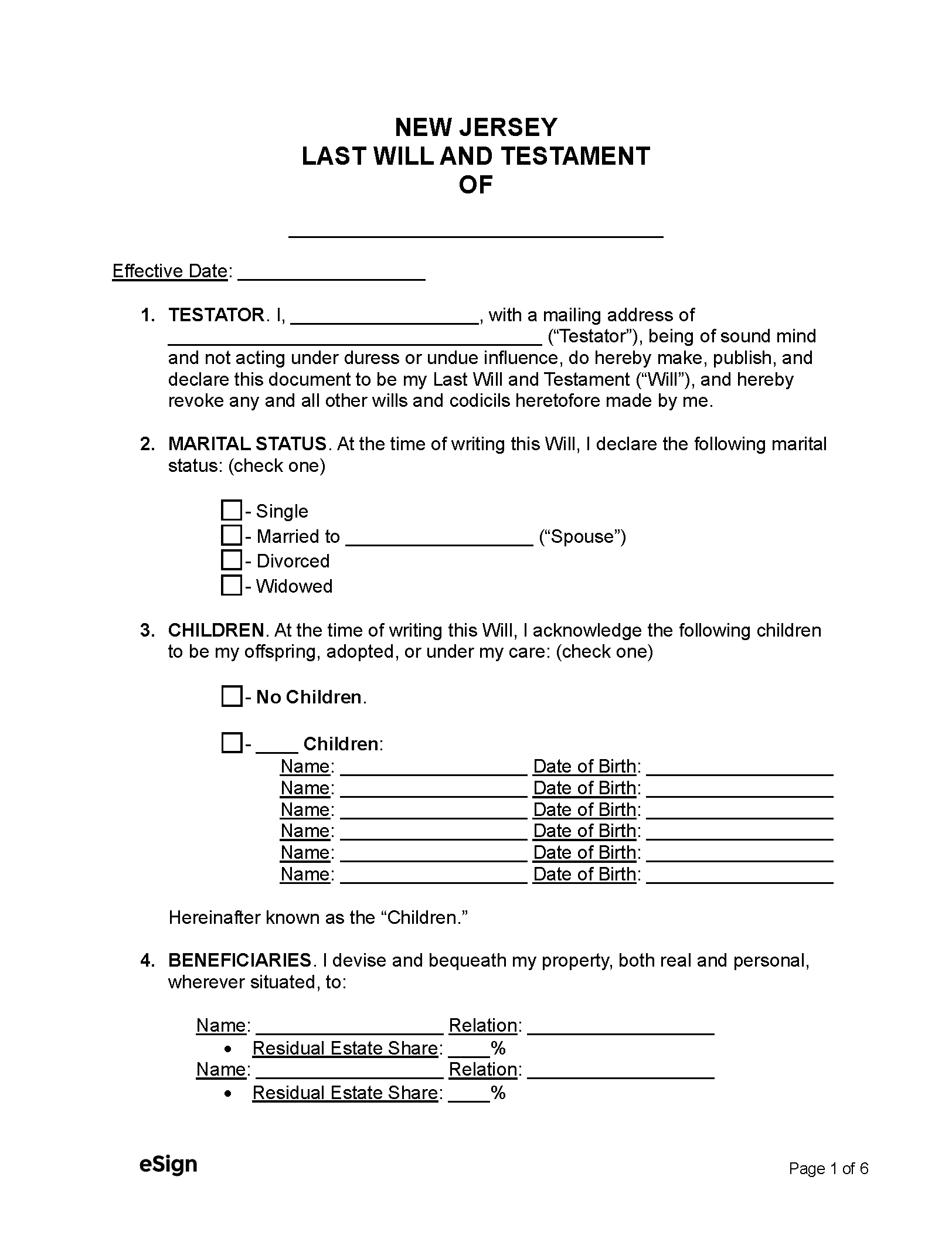A New Jersey last will and testament is a document created to leave instructions for the distribution of property and other assets after a person’s death. It should outline which assets are to be transferred to which beneficiaries, who will act as executor (person in charge of transferring assets), and how much the executor will be paid.
Any individual can make a will as long as they are of sound mind and at least 18 years of age.[1]
State Laws
Holographic Wills – A will written and signed by hand is valid as a holographic will in New Jersey.[2]
Revocation – To revoke a will, the testator must destroy the original document or create a new will with the intention of revoking the old one.[3]
Signing Requirements – Other than holographic wills, the document needs to be signed by the testator and two witnesses.[4]
Probate Process in Jersey (9 steps)
The information provided in these steps follows a regular probate process passing through a surrogate court, which typically takes nine months to one year.[5] If there are any objections or disputes concerning the probate of the will, the process may be turned over to the superior court in the appropriate county.[6]
- Proving the Will
- Letters Testamentary
- Notice of Probate
- Publication of Notice (If Applicable)
- Inventory and Appraisal
- Taxes
- Informal Accounting
- Formal Accounting (If Applicable)
- Distribution and Discharge
1. Proving the Will
If the decedent died intestate (without a will) and the estate is small enough, a surviving spouse or next of kin may be able to avoid the probate process by filing the appropriate Affidavit of Assets and Declaration.[7][8]
To commence probate proceedings, the executor (if one was named in the will) must submit the will for probate with the surrogate’s court in the county where the decedent resided.[9] They can file the will anytime, but it will not be admitted to probate by the surrogate until ten days have passed since the decedent’s death.[10]
If the will was self-proved (signed by all parties before a notary public), it will be admitted without need of proof. If it was not self-proved, one of the witnesses or an individual who knows the will was executed properly must appear and sign a Proof of Witness.[11]
Along with the will, the executor must present identification and file a certified copy of the death certificate and an Estate Information Sheet.
2. Letters Testamentary
If the will is valid and all documentation is accepted, the surrogate will have the executor sign qualification papers and provide them with Letters Testamentary.[12] These letters give them the authority to act on behalf of the estate and administer it according to the will.
Furthermore, copies of the letters can be used to sell and transfer real estate and to provide proof of the executor’s authority to transfer the decedent’s estate from banks, investment firms, insurance companies, etc. For this reason, the executor should ask the surrogate for copies of the letters, known as Surrogate Certificates, to present to each entity.
3. Notice of Probate
The executor is responsible for notifying all heirs, beneficiaries, and next of kin within 60 days that the will has been admitted to probate.[13] A Notice of Probate of Will must be delivered to each individual in person or by mail along with a copy of the will. Certified mail with a return receipt requested is not always required, but it is recommended.
A Proof of Mailing must be completed after the notice has been sent (the form is included in the Notice of Probate package). The Proof of Mailing and the original Notice of Probate must be sent to the surrogate’s office within ten days of sending the notice.
4. Publication of Notice (If Applicable)
If an interested party cannot be located, the Notice of Probate must be published in a newspaper that is distributed in the county where the will was probated. The published notice must include the names of the individuals who could not be located and state that they may have an interest in the probate of the estate.
5. Inventory and Appraisal (If Applicable)
An inventory and appraisal of the decedent’s estate may need to be completed and filed by the executor. An inventory is mandatory only if the court requires it or if the decedent’s family is entitled to certain personal assets that are protected from creditors.[14][15]
In most cases, the executor will appoint someone to conduct the appraisal. If there is an exemption benefit for the family, the surrogate court will designate two appraisers who have no interest in the estate and no relation to the surviving family.[16]
The inventory does not need to be filed until three months after the letters testamentary were granted unless the exemption benefit for the family as mentioned above is applicable, in which case it must be filed within the three months.
6. Taxes
Before preparing a final accounting of the estate and distributing the assets, all estate and inheritance tax returns must be filed. Estate tax has been eliminated in the state of New Jersey, but the executor may need to file inheritance or federal estate tax returns.
Inheritance Tax
Whether an inheritance tax return must be filed depends on the relationship between the decedent and the beneficiaries, as well as the value of the assets being transferred.[17] An Inheritance Tax Return (Form IT-R) must be filed unless it is determined that the beneficiaries are exempt (known as Class A beneficiaries).
If an inheritance tax return doesn’t need to be filed, the executor must instead complete and file the Affidavit for Real Property Tax Waiver (Form L-9) with the New Jersey Division of Taxation. To transfer non-real estate property to Class A beneficiaries, the executor must complete a separate Affidavit for Non-Real Estate Investments (Form L-8) for each institution holding assets for transfer.
Federal Estate Tax
A federal estate tax return only needs to be filed if the value of the estate is very high.[18] If the estate passes the threshold, IRS Form 706 must be filed. A copy of this form must also be filed with the NJ Division of Taxation within thirty days of filing the original, along with any documents received from the IRS.
7. Informal Accounting
An accounting of the estate must be produced by the executor. This can only be completed once all creditors’ claims have been paid, which must be filed within nine months of the decedent’s death.
An accounting is a summary of all assets remaining in the estate, the income received, debt and tax payments made, and the proposed distribution of assets to the beneficiaries. In many cases, the executor can take an informal accounting approach which only requires a general summary to be sent to the beneficiaries that does not need to be filed with the court.
They must have each beneficiary sign a Refunding Bond & Release form and file it with the court. The form indicates that the beneficiaries agree with the proposed distribution and release the executor from any liability or claim related to said distribution.[19]
8. Formal Accounting (If Applicable)
A more time-consuming and costly process is a formal accounting, which may be required if the estate is large or complex, if the beneficiaries don’t agree to an informal accounting, or if the court mandates it.[20] The executor must complete a line-by-line itemization of all assets, income, payments, and distributions, with receipts and statements attached.
The accounting gets filed with the superior court instead of the surrogate court along with an Order to Show Cause form. The account will be audited (for a fee), and a hearing will be set. On the date of the hearing, the court will hear any disputes from interested parties. Once all issues have been settled, the court will approve the accounting.
9. Distribution and Discharge
Once the formal/informal accounting has been approved, the executor can distribute the assets to the beneficiaries according to the testator’s wishes. The executor is considered discharged from their appointment after the distribution as they have either filed a Refunding Bond & Release (informal accounting) or received court approval (formal accounting).

